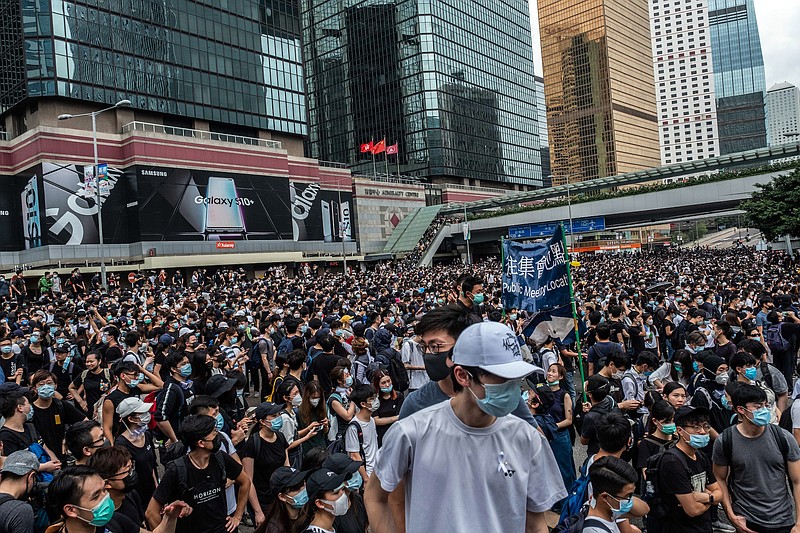Imagine if in 2018 the Trump administration had proposed legislation that would allow the government, on nearly any pretext, to detain, try and imprison Americans accused of wrongdoing at secretive black sites scattered across the country.
Imagine, further, that 43 million Americans had risen in protest, only to be met by tear gas and rubber bullets while Mitch McConnell and Paul Ryan rushed the bill through a pliant Congress. Finally, imagine that there was no effective judiciary ready to stop the bill and uphold the Constitution.
That, approximately, is what's happening last week in Hong Kong.
An estimated 1 million people - nearly 1 in 7 city residents - have taken to the streets to protest legislation that would allow local officials to arrest and extradite to the mainland any person accused of one of 37 types of crime. Political offenses are, in theory, excluded from the list, but nobody is fooled: Contriving criminal charges against political opponents is child's play for Beijing.
In 2015, mainland authorities abducted five Hong Kong booksellers known for selling politically sensitive titles and held them in solitary confinement for months until they pleaded guilty to various offenses. In 2017 Chinese billionaire Xiao Jianhua was abducted by Chinese authorities from the Four Seasons in Hong Kong. He hasn't been seen publicly since, while his company is being stripped of its holdings.
The extradition bill is the next evolution in this repressive trend. It probably won't be the last.
Hong Kong's relationship with the mainland is supposed to be governed by the principle of "one country, two systems." But as with any form of pluralism, it's a principle that poses inherent dangers to Beijing. It was little West Berlin that, merely by being free, helped bring down the Honecker regime in East Germany in 1989. The Chinese supreme leader, Xi Jinping, isn't about to let that happen to him via Hong Kong.
Then again, maybe he shouldn't be so worried. Throughout the 1980s the free world was politically united and morally confident: It believed in its liberal-democratic values, in their universality, and in the immorality of those who sought to abridge or deny them.
It also wasn't afraid to speak out. When Ronald Reagan called the Soviet Union "the focus of evil in the modern world," one prominent liberal writer denounced him as "primitive." But it was such rhetoric that gave courage to dissidents and dreamers on the other side of the wall. What's really primitive is to look upon the oppression of others and, whether out of deficient sympathy or excessive sophistication, remain silent.
Compare the free world then with what it is today. "I'm sure they'll be able to work it out" was just about all Donald Trump could say about the Hong Kong protests during a news conference Wednesday with the Polish president, Andrzej Duda.
Trump and Duda are two of the more prominent champions of the new populist nationalism, which believes in butting out of the affairs of others so they may butt out of yours.
All this means that Xi can dispose of the Hong Kong demonstrators as he likes.
That's not to say that Hong Kongers should give up hope. As William McGurn pointed out in an astute Wall Street Journal column, the extradition bill has turned law-abiding Hong Kongers into a million new Chinese dissidents. Democracies may frequently be ill-led, but they have the saving grace of making discontent work for the system, not against it. Authoritarian regimes don't have that option. The inflexibility that makes them fearsome also makes them brittle.
The world continues to endure a democratic recession. It won't last forever. The efficient authoritarianism that is supposed to be the secret to China's global ascendancy is being exposed for what it is - a state whose greatest fear is the conscience of those marching in Hong Kong's streets.
The New York Times
